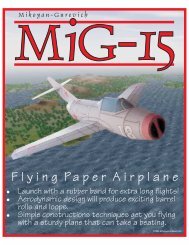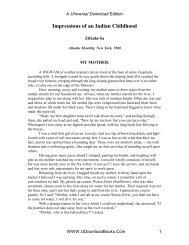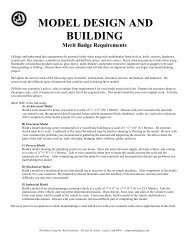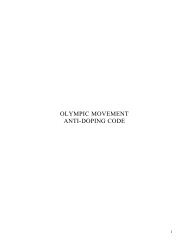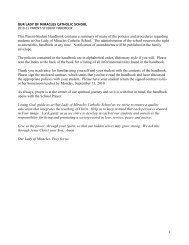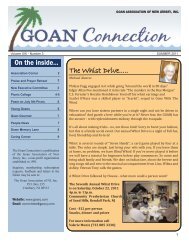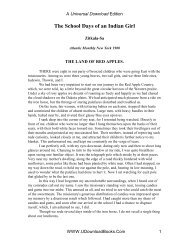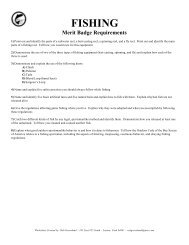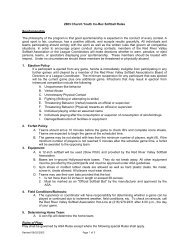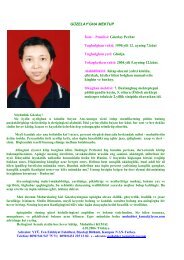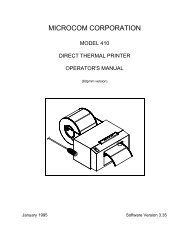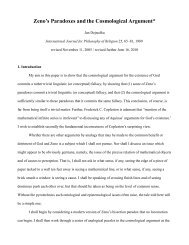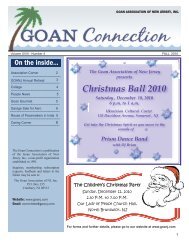Dummett's Backward Road to Frege and to Intuitionism - Tripod
Dummett's Backward Road to Frege and to Intuitionism - Tripod
Dummett's Backward Road to Frege and to Intuitionism - Tripod
Create successful ePaper yourself
Turn your PDF publications into a flip-book with our unique Google optimized e-Paper software.
not a function.” But he starts the paragraph by restricting its scope <strong>to</strong> the domain of “arguments <strong>and</strong><br />
values” (1970b: 32). And three pages earlier, he distinguishes senses from references only <strong>to</strong> set senses<br />
aside for the rest of the paper (1970b: 29). Thus I have never read these texts as saying that all entities<br />
are objects or functions, though they obviously seem <strong>to</strong> say that if they are read out of context. The<br />
texts say only that all cus<strong>to</strong>mary references are objects or functions, <strong>and</strong> do not say that all entities are,<br />
because in both works the context shows that <strong>Frege</strong> is taking special care <strong>to</strong> distinguish senses from<br />
cus<strong>to</strong>mary references, so as <strong>to</strong> talk only about cus<strong>to</strong>mary references.<br />
In The Interpretation of <strong>Frege</strong>’s Philosophy, Dummett speaks of “<strong>Frege</strong>, with his classification<br />
of what exists in<strong>to</strong> objects <strong>and</strong> functions” (1981a: 429). He admits that senses are entities. And he still<br />
rejects Peter Geach’s thesis that incomplete senses are functions (1981a: 251–53). These three points<br />
collectively imply that Dummett still holds that all senses—even incomplete senses—are objects. He<br />
says that <strong>Frege</strong> “distinguish[es] various kinds of object: logical objects; physical objects; ideas <strong>and</strong><br />
other mental contents; rational beings; thoughts <strong>and</strong> other senses....” (1981a: 429). 25 The rest of the<br />
paragraph confirms he means thoughts <strong>and</strong> all other senses (1981a: 429, “Still less....”). 1981a (393,<br />
“But, in general...” ) also confirms this. He duly discusses again in what way senses are incomplete<br />
(1981a: 265–70), <strong>and</strong> seems <strong>to</strong> take the same way out (1981a: 270).<br />
In light of all this, Dummett’s positive statement that incomplete senses are objects is<br />
surprisingly weak: “on a non-<strong>Frege</strong>an use of the word ‘concept’ [<strong>to</strong> mean incomplete sense], it might<br />
be held that ‘the concept of citizenship’ s<strong>to</strong>od for the sense of the word ‘citizen’,” where the singular<br />
definite article indicates an object (1981a: 90, my emphasis). The most he is willing <strong>to</strong> argue is that:<br />
Since “the sense of the name ‘Mont Blanc’,” <strong>and</strong> “the thought that the Earth is larger<br />
than the Moon,” <strong>and</strong> “Pythagoras’s Theorem” do appear <strong>to</strong> function as what <strong>Frege</strong><br />
called “proper names,” there is, for <strong>Frege</strong>, no question that at least some senses are<br />
42



